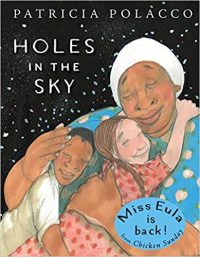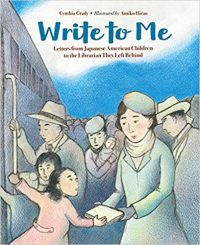
Our collection of picture books featuring Black and Indigenous people and People of Color (BIPOC) is available to the public. *Inclusion of a title in the collection DOES NOT EQUAL a recommendation.* Click here for more on book evaluation.
Find titles using a keyword search below (e.g. adoption, birthday, holidays, etc.), or by selecting one or a combination of filters on the lefthand sidebar below.
First time here? Start here!
20 matching books
Show FiltersFilter Results
-
Cross Group 20
-
Incidental 20
-
Activism 6
-
Fiction 13
-
Boy/Man 17
-
Girl/Woman 13
-
Secondary 18
- 1
- 2

16 Words
"This simple nonfiction picture book about the beloved American poet William Carlos Williams is also about how being mindful can result in the creation of a great poem like “The Red Wheelbarrow”—which is only sixteen words long. “Look out the window. What do you see? If you are Dr. William Carlos Williams, you see a wheelbarrow. A drizzle of rain. Chickens scratching in the damp earth.” The wheelbarrow belongs to Thaddeus Marshall, a street vendor, who every day goes to work selling vegetables on the streets of Rutherford, New Jersey. That simple action inspires poet and doctor Williams to pick up some of his own tools—a pen and paper—and write his most famous poem. In this lovely picture book, young listeners will see how paying attention to the simplest everyday things can inspire the greatest art, as they learn about a great American poet." -- publisher

Sweet Tamales for Purim
"Many Jewish families helped settle, diverse communities in the desolate, desert terrain of the Wild West. Although Sweet Tamales for Purim is a work of fiction, it is inspired by a true event. In 1886, the Hebrew Ladies Benevolent Society of Tucson planned a Purim Ball for the entire community. Barbara tells the story from the perspective of a young girl, who along with her new friend, Luis plan to create a Purim festival for their town. Their plans for the celebration were well underway until the family goat, Kitzel, ate all of the traditional holiday pastries, Hamantashen. Fortunately, they find another way to celebrate Purim and the family is able to share their cultural traditions with their new neighbors. Purim celebrates the courageous stand that Queen Esther made to save the Jewish people from being banished by the king. The young girl's determination to create a spirited Purim celebration in her western town, provides a unique insight into how children can creatively overcome challenges when life doesn’t go as planned. Her quick thinking, persistence and resourceful actions give their first Purim festival added significance." -- publisher

Friend on the Freedom River
"On a cold December night, Louis must decide whether to brave the treacherous Detroit River to take a slave family to freedom." -- publisher

Everybody brings noodles
The block party was Carrie's idea, but when it arrives she can only think about two things: the talent show and the delicious noodle dishes from many countries that her neighbors are bringing.

IntersectionAllies: We Make Room for All
IntersectionAllies isn’t just a book. It’s a mirror in which kids of all genders, races, sexualities, abilities, cultures, and origins can see their whole selves reflected, respected, and celebrated. In a world increasingly fractured by xenophobia, racism, ableism, homophobia and transphobia, and other forms of injustice, IntersectionAllies teaches the meaning of “community” to kids and parents alike, along with rhyming strategies to support and celebrate each other’s differences.--from Publisher's website

Time for school!
Even though she has just moved to Tinyville Town, everyone at her new school, from Principal Paul to the lunch lady, is kind and does his or her part to keep things running smoothly for Ellie Emberley on her first day of school.

A scarf for Keiko
In Little Tokyo, Los Angeles, in 1942, after Sam's Japanese neighbor, Keiko, is sent to an internment camp with her family, he makes a special effort to send her a gesture of friendship.

Holes in the sky
Soon after her beloved grandmother's death, Trisha's family moves to a diverse California neighborhood where she meets Stewart and his grandmother, Miss Eula, who brings people together to help a grieving neighbor.

Write to me
A touching story about Japanese American children who corresponded with their beloved librarian while they were imprisoned in World War II internment camps. When Executive Order 9066 is enacted after the attack at Pearl Harbor, children's librarian Clara Breed's young Japanese American patrons are to be sent to prison camp. Before they are moved, Breed asks the children to write her letters and gives them books to take with them. Through the three years of their internment, the children correspond with Miss Breed, sharing their stories, providing feedback on books, and creating a record of their experiences. Using excerpts from children's letters held at the Japanese American National Museum, author Cynthia Grady presents a difficult subject with honesty and hope.

Mississippi morning
Amidst the economic depression and the racial tension of the 1930s, a boy discovers a horrible secret of his father's involvement in the Ku Klux Klan. It was 1933 and life was good for James William. Piece by piece, however, his comfortable life begins to unravel. First he learns that the burning of a black man's house was not accidental. Then his fishing buddy LeRoy tells him about the hanging tree and the Klan. Though he accepts that blacks and whites can't drink from the same fountains because "that's the way it is," James William can't believe that racial hatred exists in his own community until he comes face to face with a Klan member. A thought- provoking story of one boy's loss of naivete in the face of harsh historical realities, Mississippi Morning will challenge young readers to question their own assumptions and confront personal decisions
- 1
- 2
